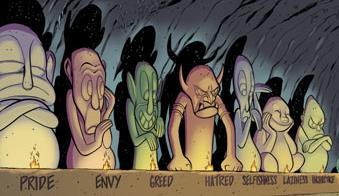Pride versus Progress
There's nothing wrong with being corrected to what's right.
I recently encountered another episode which demonstrated in a small way the affliction of overmuch self-consciousness. A young friend, in an effusive text reply, clearly mis-read what I had written. I corrected the error. My friend then apologized profusely. No problem, I said, but just take things slow, read twice, I recommended. The reply to something I wrote the next day was a noticably more reserved "OK," which actually didn't even make sense in the context. Knowing this individual's character, I suspect that the reticence of the second incident was in response to the earlier correction, a self-conscious over-reaction to having been found before to be wrong.
Mere correction should be cause for thankfulness, really, but all too frequently the one being corrected feels chided, put down for being in error, and this in turn generates defensiveness, and defensiveness severely complicates learning.
We are all imperfect, while being commanded to be perfect. In this world of "trial and error," wisdom often can only be achieved through learning from error. When one is instructed on what is right, there is intrinsically, inevitably, a certain emphasis upon the fact of having been in error. Correction should be celebrated, as one more step of growth, but the Ego gets in the way. The Ego doesn't want to be wrong, or more correctly, since Ego alone does not have a value system to discern right and wrong, Ego does not want to be found out as being wrong. Being wrong, the Ego imagines, means shame, and invokes guilt, as if one should already have mastered something the first time out, as if mere error were conscious sin.
Pride may be the most insidious of the "deadly sins." Most folks can admit that wrath or sloth are unwelcome traits, but Pride defends itself proudly. The reasons for error are essentially irrelevant to correction, but when pride stands in the way of correction, the focus is not on the goodness of correction but on badness of the error, and the Ego, feeling belittled, becomes engaged in defense. "I was only…" "I just meant…" "All I was doing was…" This thoughtless defensive posture not only de-emphasizes the correction, but reinforces the error in the gestalt of the subconscious. Even though the correction may be intellectually acknowledged, rather than the grateful "Aha!" of honest truth-recognition, the emotional memory is more of a disingenuous "oh, yeah?" of self-justification. And all such defensiveness stems from Pride.
Pride thwarts learning, and thus hinders growth. Growth is our goal, with perfection our destiny. Thus, defensive and misplaced Pride stands athwart our path, and threatens us with the opposite of eternal life.




